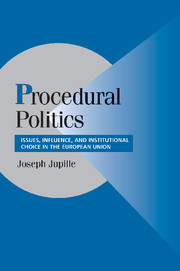Book contents
- Frontmatter
- Contents
- List of Figures
- List of Tables
- Preface and Acknowledgments
- List of Acronyms Used in the Text
- 1 INTRODUCTION: CHOICE, CONSTRAINT, AND EUROPEAN UNION INSTITUTIONS
- 2 THEORIZING PROCEDURAL POLITICS: ISSUES, INFLUENCE, AND INSTITUTIONAL CHOICE
- 3 THE EUROPEAN UNION AS A PROCEDURAL SYSTEM: RULES, PREFERENCES, AND STRATEGIC INTERACTION
- 4 PATTERNS: DETERMINANTS AND EFFECTS OF EU PROCEDURAL POLITICS
- 5 GREENING THE MARKET? PROCEDURAL POLITICS AND EU ENVIRONMENTAL POLICY
- 6 MAD COWS AND ENGLISHMEN: PROCEDURAL POLITICS AND EU AGRICULTURAL POLICY
- 7 CONCLUSION: PROCEDURAL POLITICS AND RULE GOVERNANCE IN THE EUROPEAN UNION AND BEYOND
- Bibliography
- Index
- Cambridge Cultural Social Studies
7 - CONCLUSION: PROCEDURAL POLITICS AND RULE GOVERNANCE IN THE EUROPEAN UNION AND BEYOND
Published online by Cambridge University Press: 24 July 2009
- Frontmatter
- Contents
- List of Figures
- List of Tables
- Preface and Acknowledgments
- List of Acronyms Used in the Text
- 1 INTRODUCTION: CHOICE, CONSTRAINT, AND EUROPEAN UNION INSTITUTIONS
- 2 THEORIZING PROCEDURAL POLITICS: ISSUES, INFLUENCE, AND INSTITUTIONAL CHOICE
- 3 THE EUROPEAN UNION AS A PROCEDURAL SYSTEM: RULES, PREFERENCES, AND STRATEGIC INTERACTION
- 4 PATTERNS: DETERMINANTS AND EFFECTS OF EU PROCEDURAL POLITICS
- 5 GREENING THE MARKET? PROCEDURAL POLITICS AND EU ENVIRONMENTAL POLICY
- 6 MAD COWS AND ENGLISHMEN: PROCEDURAL POLITICS AND EU AGRICULTURAL POLICY
- 7 CONCLUSION: PROCEDURAL POLITICS AND RULE GOVERNANCE IN THE EUROPEAN UNION AND BEYOND
- Bibliography
- Index
- Cambridge Cultural Social Studies
Summary
“The rules!” shouted Ralph. “You're breaking the rules!”
“Who cares?”
Ralph summoned his wits.
“Because the rules are the only thing we've got!”
Like other political systems, the identity of the European Union (EU) is written in its rules (institutions). More than in ideal-typical national political systems – systems characterized by common languages, histories, cultures – however, formal rules both preponderantly determine and most clearly articulate what the EU does and what the EU is. At the same time, as a relatively pure system of rules, unencumbered by deeply rooted cultural political, linguistic, and other bonds, the EU provides a particularly fruitful laboratory within which to learn general things about institutions. Understanding where rules come from and how they operate is the raison d'être of the booming institutionalist research program; the study of the EU, in which the operation of formal rules is so transparently important, has influenced and will continue to influence the progress of that research program.
Rules, though, have a “dual nature” (Grafstein 1992). Though “humanly devised,” they are also “constraints that shape human interaction” (North 1990). Absent some measure of endogeneity, institutions lose their definitional quality as objects of human design or choice. Absent some exogeneity to the preferences and power of, and bargaining between, their creators, they lack the independent effects that make them worth studying.
- Type
- Chapter
- Information
- Procedural PoliticsIssues, Influence, and Institutional Choice in the European Union, pp. 221 - 246Publisher: Cambridge University PressPrint publication year: 2004



